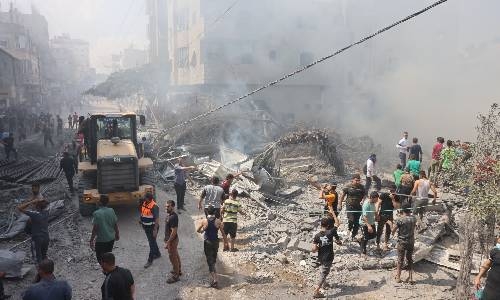Are war crimes being committed in Israel-Hamas battle?
AFP | The Hague, Netherlands
The Daily Tribune – www.newsofbahrain.com
Hostages, sieges, indiscriminate mass killings: the recent violence in Israel and Gaza has shocked the world.
It has been six days since Hamas gunmen stormed into Israel, killing 1,200 Israelis, mostly civilians, and taking around 150 hostages in an unprecedented attack.
In response, Israel has pounded Hamas with thousands of strikes, destroying thousands of buildings and levelling entire city blocks. More than 1,200 Palestinians have died in Gaza.
Legal experts have told AFP that both sides could be accused of committing war crimes.
- How are these defined? -
"War crimes" and "crimes against humanity" were both defined in the 1998 Rome Statute that established the International Criminal Court (ICC).
A war crime is a serious violation of international law against civilians and combatants during armed conflict, a "grave breach" of the 1949 Geneva Conventions that established a legal framework for war after the Nuremberg tribunals of top Nazis.
It covers more than 50 scenarios, including killing, torture, rape and hostage taking.
It also includes deliberate attacks on undefended population centres that are not "military objectives."
A "crime against humanity" is defined as "a widespread or systematic attack directed against any civilian population" including "murder" and "extermination" as well as "enslavement" and "deportation or forcible transfer".
- Was the Hamas attack a war crime? -
"It's really quite terrible because there are violations of the laws of war from both sides," said Melanie O'Brien, visiting professor in international law at the University of Minnesota.
On the Hamas side, she points to the widespread hostage taking.
"That's a blanket prohibition. There's no conditions on that. So by doing that, that's a war crime," she told AFP.
Israel says Hamas has taken around 150 hostages, including Americans, Germans, Mexicans and Thais.
O'Brien also pointed to international laws prohibiting "violence aimed at spreading terror among the civilian population", which she said Hamas rockets into Israel appear to violate.
French Foreign Minister Catherine Colonna has said the Hamas attacks were "similar to crimes against humanity".
"On the Hamas side, I think it's fairly clear-cut. I mean, the deliberate murder of civilians is a war crime," said Ben Saul, professor in international law from the University of Sydney.
In the deadliest single assault on civilians in Israel's history, 270 revellers were gunned down or burned in their cars by Hamas gunmen at the Supernova music festival in the Negev desert.
- What about Israel's response? -
"On the Israeli side, I'd say the clearest one is the declaration of a complete siege, preventing food, fuel, water, energy coming in. In terms of criminal liability, starvation is a war crime," Saul told AFP.
Israel has announced a "complete siege" on the Gaza Strip, cutting off the water supply, food, electricity and other essential supplies.
United Nations human rights chief Volker Turk has already said that such a siege depriving civilians of goods required for survival is illegal under international humanitarian law.
Sieges per se are not prohibited by international law, O'Brien noted.
"But what's really important in this context is that starvation as a method of warfare is prohibited."
International law also dictates that parties to a conflict "allow and facilitate rapid and unimpeded passage of humanitarian relief for civilians in need", she said.
Both Hamas and Israel have been "indiscriminately bombing each other", added O'Brien, which she said also constitutes a war crime, as it is not just targeting military personnel.
- What's the ICC's role? -
Prosecutors at the ICC opened a formal investigation in 2021 into the Palestinian territories, including alleged crimes by Israeli forces and by Hamas and Palestinian armed groups.
Israel, which is not a member of the ICC, has refused to recognise its jurisdiction or cooperate with the probe, which covers possible crimes going back to the 2014 war in Gaza.
The court has said only that its mandate to investigate crimes going back to 2014 is ongoing and would also apply to any alleged crimes committed during the current war.
"It would be good to see the International Criminal Court prosecutor make a stronger statement to urge the parties to the conflict to not violate the laws of war, and to say that people will be prosecuted," said O'Brien.
The situation is complicated by the definition of the conflict as "national" or "international" and the status of the Palestinian territories, added Saul.
"The difficulty with Gaza is that half of international lawyers say it's occupied, the other half say it's not.
"If it is occupied, it's an international conflict. The full list of war crimes applies under the Rome Statute," he said.
"That's an important legal question for the court, which is yet to be determined."
Related Posts

